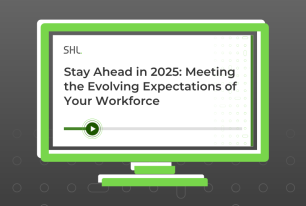Celebrating Purple Tuesday with an Update on SHL’s Neurodiversity Research Program
2022 has been an exciting year for SHL’s Neurodiversity Research Program. Read some key takeaways that you can implement to join us in making a difference.
Share
It was an honor for SHL to be part of the Purple Tuesday UK celebrations in London last week, and our American colleagues were delighted to be able to join in by holding our first event at our Minneapolis office as the movement went global. For those not familiar with it, Purple Tuesday is a ‘global social movement’ that aims to promote awareness and understanding and drive accessibility improvements to improve the customer experience for disabled people and their families.
As someone with hearing loss, and also the mother of a young child who recently started receiving support from school for Attention Deficit Hyperactivity Disorder (ADHD), this topic is close to my heart. And we are far from alone – The World Health Organization estimates that 15% of the global population experience disability; that is over one billion people. About another 20% of the population are caregivers for individuals with disabilities according to reports across Europe and the US.
“Our Neurodiversity Research Program has been shortlisted for the ‘Making a Difference – Private Sector’ award by the Recruitment Industry Disability Initiative.”
Having worked at SHL for nearly 12 years, I have witnessed SHL’s growing commitment to ensuring that our talent solutions offer inclusive and accessible experiences for all candidates and result in fair talent decisions, including neurodivergent talent. It was our partnership with Purple that was the catalyst for launching our Neurodiversity Research Program, which seeks to improve the assessment experience of neurodiverse talent. I am delighted to share our research program has recently been shortlisted for the ‘Making a Difference – Private Sector’ award by the Recruitment Industry Disability Initiative (RIDI). This a particularly meaningful category for us on the research team, given that this is what we are striving to achieve!
We were able to share some of the insights from our research program at last month’s Purple Tuesday’s Global Virtual Conference. As always, the passion and intent in the (virtual) ‘room’ were palpable, as a range of organizations shared insights into hot topics such as social leadership, accessible experiences, accessible marketing, and global tech trends and innovations. In the latter session, we shared a preview of the key takeaways from our recently published Assessing Neurodiverse Talent White Paper, which are also summarized below. I encourage you to read our white paper for an introduction to this important topic and more detailed findings and takeaways.
A key theme that emerged from the conference was how disability inclusion is about going on a journey and recognizing that it’s about continually developing so you become more accessible and inclusive year after year. Whether your organization is relatively early in its journey or has already made great strides in this area, we must all continue to drive this forward.
“Disability inclusion is about going on a journey – it’s about continually developing so you become more accessible and inclusive year on year.“
One of the things I loved about the Purple Tuesday events is the focus on sharing practical hints that delegates can take away to implement, so here are ours!
- Cognitive assessment is a promising option for assessing neurodivergent talent based on our research exploring score differences, time taken, and reactions about engagement and fairness.
- Neurodivergent talent is likely to have a ‘spiky profile’ with areas of both strength and challenges, which has implications for how recruiters select, measure, and make decisions about competencies.
- These strengths and challenges vary by condition. While there is some overlap between conditions, there is also some variance, highlighting that it’s important to study them separately, so as not to dilute findings, and not to generalize findings to all neurodivergent talent.
- A one size fits all approach per condition does not apply. Reactions to assessments vary from one person to the next, even those with the same neurodiverse condition, so it’s important to take an individualized approach.
- Many neurodivergent candidates are hesitant to disclose a condition that requires adjustments. This is unsurprising given the stigma and negative stereotypes that still surround neurodiversity, and the high stakes of a hiring setting. More needs to be done to ensure they get the necessary support to make the assessment process work for them.
- Small changes can make a big difference. The motto “nothing about us, without us” really comes into play here. Gathering feedback from neurodivergent candidates can really help to identify tangible suggestions to enhance the assessment experience, many of which take little effort to implement, but could have a significant impact.
Earlier this year I had the privilege of taking over the reins of the research program and I am very proud to be heading it up. We have just finalized our agenda for 2023 and are excited about the wider and deeper range of insights and takeaways we will be able to share in our annual report next year!
Check out our recently published white paper if you’d like to read more about our neurodiversity research. You can also access a range of relevant resources here.
Please contact me to learn more and to find out how to get involved in our research.











